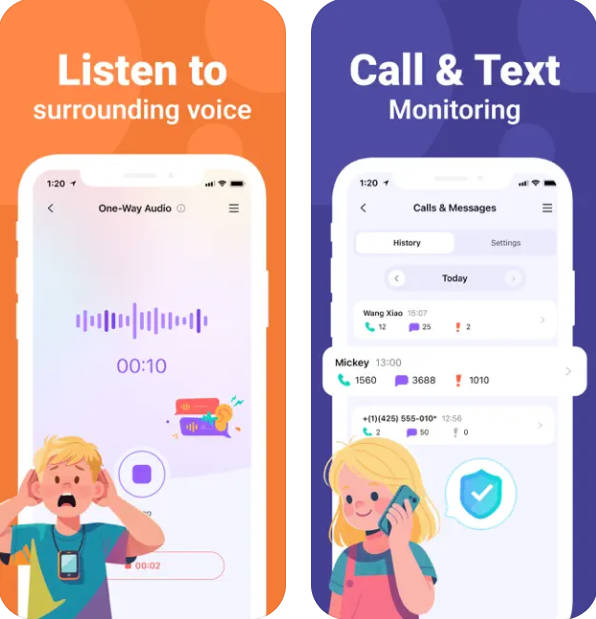Za meaning may look short and harmless, but for parents trying to decode their teens’ messages, it can be confusing. One moment it refers to pizza 🍕, the next it hints at marijuana 🌿. With slang spreading fast across TikTok, Snapchat, and group chats, parents are left wondering: what does za mean?
This guide explains the origins of za slang meaning, the different ways it’s used, and why it matters for families. Along the way, you’ll also discover practical communication tips, cultural insights, and how FamiSafe can help you keep up with evolving teen slang while protecting your child online.

In This Article
Part 1. What Does ZA Mean?
The slang term za isn’t new, but its popularity has spiked again thanks to social media. It has two primary meanings depending on the context:
Origins: The pizza usage dates back to the 1970s in U.S. college culture, where shortening words was trendy. The drug reference is more recent, amplified by rap lyrics, internet memes, and mainstream media. Interestingly, “za” also appears in Scrabble dictionaries, cementing its place in American slang history.
Regional Differences: While Americans commonly use “za” for pizza, the marijuana reference is more prominent in urban and online youth circles. Parents outside the U.S. may hear “za” for the first time in connection with hip-hop or internet slang, showing how digital culture spreads globally.
Parents need to pay attention because za meaning slang can signal harmless teen chatter—or potentially risky behavior.
Part 2. How to Use ZA Properly?
Teens often use slang like “za” to save time, sound trendy, or bond with friends. Here’s how it commonly shows up:
1. In Text Messages – A simple “Want za?” between friends usually means pizza. But if paired with the 🌿 emoji, the context shifts entirely.
2. On Social Media – TikTok captions like “Best za in town 🍕” are common. In contrast, music videos or Instagram posts may reference “smoking za.”
3. In Music & Pop Culture – Artists like Future, Wiz Khalifa, and other rappers frequently use “za” in lyrics to reference marijuana. Teens then copy this language in their own chats, normalizing it in everyday use.
4. In Memes & Inside Jokes – Online culture loves exaggerating slang. Memes about “pizza vs. za” sometimes blur the harmless vs. risky meaning, leaving parents unsure.
5. In Gaming Chats 🎮 – Multiplayer games often involve shorthand communication. Teens may type “za break” meaning pizza, or, depending on the group, hint at drug-related slang.
6. Among Different Age Groups – College students may still use “za” casually for pizza, while high schoolers influenced by rap culture may lean toward the drug meaning. Context is everything.
Tip 💡
Pay attention to emojis. 🍕 usually signals food, while 🌿, 🚬, or 🔥 suggest drug-related slang. If unsure, ask casually—this builds trust without judgment.
Part 3. Why Parents Should Learn Slang Like ZA
Parents might think slang is just “teen talk,” but words like za slang meaning can impact real-life choices. Here’s why learning slang is crucial:
- Stay Connected 🧩 – Understanding popular teen slangs help you engage in your teen’s world instead of feeling left out.
- Spot Risks 🚨 – Knowing when “za” means marijuana allows you to step in if risky behavior arises.
- Encourage Open Talk 🗣️ – If you recognize slang, you can ask questions without sounding clueless, making it easier for teens to open up.
- Reduce Misunderstandings 🔍 – Misinterpreting slang can cause unnecessary conflict. Clear understanding prevents overreaction.
Real-Life Example: One parent noticed their teen’s chat saying “got za.” Initially worried, they asked calmly, and it turned out to be about ordering pizza after basketball practice. Without understanding slang, that moment could have led to unnecessary tension.
Practical Strategies for Parents:
- Use slang as conversation starters rather than confrontation.
- Ask your teen to “teach you” slang—it shows interest and builds connection.
- Stay updated by following teen culture blogs or using monitoring apps.
However, monitoring every word your teen uses can be overwhelming. This is where tools like FamiSafe become invaluable.

How FamiSafe Helps:
- Detects risky slang words across platforms like WhatsApp, TikTok, and Instagram
- Sends instant alerts if concerning words appear
- Provides activity reports to understand your teen’s online behavior
- Filters inappropriate websites and apps proactively
- Encourages healthy screen time and safer online habits
- Social Media Monitoring
- App & Website Filtering
- Screen Time Scheduling
- Location Tracking for Safety
Conclusion
Slang like za meaning slang may seem small, but it opens a window into teen culture. Whether it’s pizza 🍕 or marijuana 🌿, understanding the difference allows parents to build trust, encourage honest conversations, and act early if red flags appear.
Key Takeaways for Parents:
- Always check the context and accompanying emojis.
- Ask your teen directly in a calm, curious way.
- Stay updated with evolving slang to avoid miscommunication.
- Leverage parental tools like FamiSafe for proactive monitoring.
Instead of being left in the dark, take time to ask your teen what words mean in their world. And when you need extra support, FamiSafe is there to decode slang, send alerts, and keep your child’s digital life safer. 💬
Frequently Asked Questions
-
Q1. Is “za” always about marijuana?
No. In many cases, “za” simply means pizza. Emojis and context usually reveal the intended meaning. -
Q2. Where did the slang “za” come from?
“Za” as pizza originated in 1970s college slang. Its marijuana meaning rose in the 2010s, especially in hip-hop culture and online communities. -
Q3. How can parents track risky slang use?
Parents can monitor manually by checking context or use apps like FamiSafe that detect slang across platforms automatically. -
Q4. What other slang terms are similar to “za”?
Similar shorthand includes “sus” (suspicious), “cap/no cap” (lie/truth), and “finna” (going to). Like “za,” these words shift quickly across platforms.


